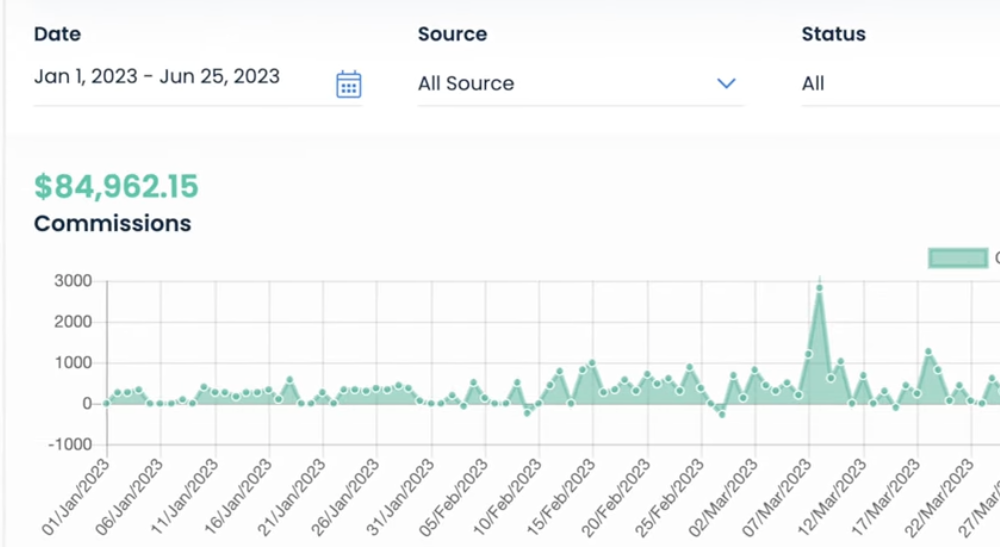Welcome to the “Free Affiliate Marketing Course for Beginners”! In this course, brought to you by Ahrefs, we will guide you through the entire process of creating a successful affiliate site. We’ll cover all the essential aspects, from the basics of affiliate marketing to finding and qualifying niches and programs, planning your site, creating engaging content, and building strong backlinks. Our focus will be on attracting relevant and consistent traffic to your site, using search engine optimization (SEO) as a powerful tool. By the end of this course, you’ll have a clear blueprint for starting and growing an affiliate website, and you’ll be equipped with the tactics and strategies needed to generate consistent revenue through affiliate commissions.
Let’s dive into the first lesson of the course, where we’ll discuss what affiliate marketing is and how it works. We’ll explore the concept of affiliate links and cookies, and explain how you can earn commissions by promoting products from other companies. So, without further ado, let’s embark on this exciting journey and learn how to build a successful affiliate site!

This image is property of i.ytimg.com.
Module 1: Affiliate Marketing Basics
Introduction to affiliate marketing
Affiliate marketing is a revenue-generating strategy where you promote another company’s products and earn a commission when someone makes a purchase through your referral. It’s a mutually beneficial arrangement between the affiliate marketer and the merchant.
How affiliate marketing works
Affiliate marketing works through the use of affiliate links and cookies. When a visitor clicks on your affiliate link and makes a purchase within a certain timeframe, a cookie is stored on their device. This cookie helps the merchant attribute the sale to you, ensuring that you receive your commission.
Understanding affiliate links and cookies
An affiliate link is a unique URL that contains an identifier specific to you. It tracks the clicks and purchases made through your referrals. When a visitor clicks on your affiliate link, a cookie is stored on their device. This cookie helps attribute the sale to you, even if the purchase is made at a later time. Cookies usually have an expiration date, so it’s important to consider the cookie duration when selecting affiliate programs.
Module 2: Finding and Qualifying Niches and Programs
Identifying profitable niches
Finding a profitable niche is crucial for the success of your affiliate marketing venture. Start by identifying your passions and interests, as this will help you stay motivated and engaged. Conduct market research to determine the demand and competition in different niches. Look for niches with high demand and relatively low competition for better chances of success.
Researching potential affiliate programs
Once you have identified your niche, research potential affiliate programs that align with your niche and target audience. Look for programs that offer competitive commissions, reliable tracking systems, and a wide range of products or services. Consider factors such as program reputation, payment methods, and support to ensure the program is trustworthy and reliable.
Evaluating program reliability and reputation
Before joining an affiliate program, it’s important to evaluate its reliability and reputation. Look for reviews and testimonials from other affiliate marketers to gauge the program’s performance. Check if the program has a solid track record of timely payments and transparent reporting. Avoid programs that have a history of poor customer support or unethical practices.
Module 3: Planning Your Site
Choosing a domain name and hosting provider
Choosing a domain name is an important step in creating your affiliate website. Select a domain name that is memorable, reflects your niche, and is relevant to your audience. Consider using keywords related to your niche to improve search engine optimization. When selecting a hosting provider, look for reliability, security, and scalability to meet the needs of your growing website.
Creating a website structure and layout
Plan your website structure and layout to ensure a seamless user experience. Organize your content into logical categories and subcategories to make it easy for visitors to navigate your site. Use clear and intuitive menus, headers, and footers to guide users through your website. Consider using a responsive design to ensure your website looks good on different devices.
Setting up the necessary webpages
Set up the necessary webpages for your affiliate website, including an about page, contact page, and privacy policy. An about page helps establish credibility and build trust with your audience. A contact page allows visitors to get in touch with you for any inquiries or collaborations. A privacy policy ensures that you comply with data protection regulations and builds trust with visitors concerned about their privacy.
Module 4: Content Creation
Developing a content strategy
Develop a content strategy that aligns with your niche and target audience. Determine the types of content you will create, such as product reviews, tutorials, comparison articles, or informative blog posts. Consider the needs and preferences of your audience and create content that provides value, solves problems, and engages your readers.
Writing engaging and informative articles
Write articles that are engaging, informative, and well-researched. Use a conversational tone to connect with your audience and make your content more relatable. Incorporate storytelling techniques to captivate your readers and keep them engaged. Use headings, subheadings, and bullet points to break up your content and make it easier to read.
Including affiliate links within your content
Integrate affiliate links strategically within your content to increase conversion rates. Place them naturally within your articles and ensure they are relevant to the topic. Avoid excessive use of affiliate links, as it may come across as spammy or promotional. Disclose your affiliate partnerships transparently to maintain trust with your audience.
This image is property of images.unsplash.com.
Module 5: Link Building
Understanding the importance of backlinks
Backlinks are an essential component of search engine optimization (SEO) and play a crucial role in driving organic traffic to your affiliate website. They are links from other websites that redirect to your site. Search engines consider backlinks as a vote of confidence, indicating the quality and relevance of your content.
Implementing white hat link building strategies
Implement white hat link building strategies to build high-quality backlinks. Focus on creating valuable and shareable content that naturally attracts backlinks from reputable websites. Reach out to relevant and authoritative websites in your niche for potential collaboration or guest posting opportunities. Avoid black hat tactics such as buying links or participating in link schemes, as they can result in penalties from search engines.
Building relationships with other website owners
Build relationships with other website owners in your niche to collaborate and exchange backlinks. Engage with them through comments, social media interactions, and networking events. Offer to write guest posts for their websites and host guest posts on your site. Building these relationships can lead to valuable partnerships and opportunities for link building.
Module 6: Generating Relevant and Consistent Traffic
Utilizing search engine optimization (SEO)
Search engine optimization (SEO) is a crucial strategy for generating relevant and consistent traffic to your affiliate website. Implement on-page SEO techniques such as optimizing your website structure, meta tags, and headings. Conduct keyword research to identify search terms relevant to your niche and incorporate them strategically within your content.
Optimizing your website for search engines
Optimize your website for search engines by ensuring it loads quickly, has a mobile-friendly design, and provides a positive user experience. Improve your website’s loading speed by optimizing image sizes, minimizing plugins, and using caching techniques. Test your website’s responsiveness on different devices to ensure a seamless browsing experience for all users.
Driving organic traffic through keyword research
Keyword research is essential for driving organic traffic to your affiliate website. Use keyword research tools to identify relevant keywords and phrases with a high search volume and low competition. Incorporate these keywords naturally within your content to improve its visibility on search engine results pages (SERPs) and attract targeted traffic.

This image is property of images.unsplash.com.
Module 7: Potential Earnings of Affiliate Marketers
Exploring the income potential of affiliate marketing
Affiliate marketing has the potential to generate significant income, but the earnings vary depending on factors such as niche selection, traffic volume, and conversion rates. Some affiliate marketers have reported six-figure earnings, while others may start with smaller checks. Consistency, hard work, and effective strategies are key to maximizing your affiliate marketing earnings.
Understanding different affiliate commission structures
Affiliate commission structures vary among different affiliate programs. Common commission structures include pay-per-sale, pay-per-lead, and pay-per-click. Pay-per-sale offers a percentage of the sale value as a commission. Pay-per-lead provides a commission for each qualified lead generated. Pay-per-click offers a commission for each click on the affiliate link, regardless of whether a purchase is made.
Calculating potential earnings based on traffic and conversions
Calculating potential earnings involves considering your website’s traffic volume and conversion rates. Track the number of visitors, click-through rates, and sales conversions to gauge the effectiveness of your affiliate marketing efforts. By understanding these metrics, you can make informed decisions and optimize your strategies to maximize your earnings.
Module 8: Starting and Growing an Affiliate Website
Creating a high-level blueprint for success
Create a high-level blueprint for success by setting clear goals, defining your target audience, and planning your content creation and marketing strategies. Outline your website structure, identify key performance indicators, and establish a timeline for achieving your goals. Having a blueprint helps you stay focused, motivated, and organized throughout the process.
Setting goals and milestones for your website
Set achievable goals and milestones for your website to track your progress and measure success. These goals can include increasing organic traffic, improving conversion rates, or reaching a specific revenue target. Break larger goals into smaller milestones to make them more attainable and celebrate each milestone as you achieve it.
Scaling your website and expanding your affiliate partnerships
Scale your website by continuously creating valuable content, optimizing for search engines, and expanding your affiliate partnerships. Regularly update and refresh old content to keep it relevant and maintain search engine rankings. Explore collaborations and partnerships with complementary brands to expand your reach and attract new audiences.

This image is property of images.unsplash.com.
Module 9: Finding a Niche
Understanding the importance of niche selection
Niche selection is a critical aspect of affiliate marketing success. Choosing a niche allows you to focus on a specific audience and tailor your content and promotions accordingly. A well-defined niche increases your chances of attracting a targeted audience and standing out from the competition.
Identifying your passions and interests
Identify your passions and interests when selecting a niche for your affiliate marketing website. Building a website around a topic you genuinely enjoy allows you to create authentic and engaging content. Your passion will also keep you motivated during challenging times and help you connect with your audience on a deeper level.
Researching the competition and demand
Research the competition and demand within your chosen niche to ensure its viability. Analyze competitor websites, consider their content strategies, and identify any gaps or opportunities. Additionally, conduct keyword research to assess the search volume and competition for relevant keywords in your niche. Finding a balance between competition and demand is crucial for a successful affiliate marketing website.
Conclusion
Recap of the key concepts covered in the course
Throughout this course, we’ve covered the basics of affiliate marketing, including how it works, the importance of relevant traffic, and potential earnings. We discussed finding profitable niches, qualifying affiliate programs, and planning your website. Content creation, link building, and generating consistent traffic through SEO were also highlighted. Finally, we explored the income potential of affiliate marketing and provided a blueprint for starting and growing your affiliate website.
Final thoughts on getting started with affiliate marketing
Getting started with affiliate marketing requires dedication, patience, and a strategic approach. It’s essential to choose niches and programs carefully, create valuable and engaging content, and drive relevant traffic to your website through SEO. By consistently applying the strategies and techniques learned in this course, you can build a successful affiliate marketing website and generate consistent revenue. Remember to stay focused, adapt to changes in the industry, and always prioritize the needs and interests of your audience.





